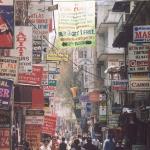Nepal Traditions
 Holidays and days off: The state and many other offices work six days a week. Saturday - the official day off. Nepal is famous for constantly successive holidays. It is said that Nepalese festivals than days in a year.
Holidays and days off: The state and many other offices work six days a week. Saturday - the official day off. Nepal is famous for constantly successive holidays. It is said that Nepalese festivals than days in a year.Nepal - the only country in the world, professing Hinduism as a state religion (Hindus constitute about 90% of the population). Also live Buddhists (5%), Muslim (3%), etc.
Nepal has only recently opened its borders to tourists, so many of us familiar types of clothing and style of behavior are perceived differently, and tourists should try to respect local traditions:
• You can not step over people sitting on the ground;
• Take items from local residents and send items they want only the right hand, supported by the left;
• Hindu temples are closed to visits;
• Buddhist temples and monasteries are open to all;
• Do not give money to begging on the streets (they appeared in Nepal only through the "generous" to tourists);
• All the temples and gompa in Nepal should bypass only in a clockwise direction and never vice versa;
• It is frequently wash their hands, you can not eat unwashed fruit.
Nepalese people are very friendly and rather simple-minded people. Long-term isolation of the country has helped to keep the best features of the local ethnic group in its original form. However, the massive invasion of tourists and climbers in the late XX century, as well as the emigration of large numbers of Tibetans from Tibet AO China, have introduced here an unprecedented number of first elements, starting with the "achievements of civilization," and ending with the emergence of a broad class of merchants. The system behavior and social relationships in the Nepalese society has changed quite weak, and the local etiquette is still markedly different from most neighboring countries. A characteristic feature of the Nepalese is their remarkable modesty in all situations of life. Thus they are extremely curious and love to chat - so that's an explosive mixture. Therefore, talk of local residents will have no difficulty, many of them are well understood English, but then make the necessary information will not be easy. Ideally, any conversation with the local people should begin with a lengthy introduction, an exchange of courtesies, and to speak, or rather to ask, will initially just Nepalese, and his questions would relate to family, work and the interlocutor of the country. And for the most part, if the case does not apply to some services and money, these issues will be a bit naive, but interest in the other person - sincere. The ratio of tourists a few condescending, but always friendly.
Common form of greeting in Nepal - folded neck palm podnosimye to the person (usually the forehead - in the case of extreme respect, or to the chin - in everyday life). It is accompanied by a gesture with the word "namaste" or, in the case of appeal to the distinguished man, "namaskar". Men usually shake hands with women is accepted to use "namaste". Primarily made to greet the most distinguished or elder person. When referring to someone else, should be added to the name of a polite ending "-ji" or generic term of polite attention "hadzhur. It is not recommended to show surprise, and violently express emotions, a public manifestation of courtesies between men and women is also not accepted (same-sex totally forbidden).
Nepalese people are accustomed to call brothers and sisters, almost all members of the community, so the same applies to friends and even strangers, in whose number reach and foreigners. So often, instead of greeting, you can hear the treatment like "brother" or "sister", and in relation to the elderly or people just deserved - "father" or "mother". This is a common norm, so do not be surprised when such treatment will sound on the tourist, even though it is possible that this will be followed petty begging ( "I will pray for you to Krishna), and stalking his proposal of" services ". You can often find some zapanibratskoe attitude toward a stranger ( "Hey, brother!"), But this is a local tradition.
The system of gestures in Nepal is also quite distinctive - consent is expressed with a nod and a shrug. "No" is denoted by shaking his head in hand, often with the Nepalese lowered gaze. To beckoned a servant or a waiter, extend a hand palm and fingers down. A nod means "yes." But some European gestures, like the thumb protruding upwards at a closed fist, it may seem unseemly here. As a guilty gesture touch the hands or body aggrieved person and then touches his hand to his head.